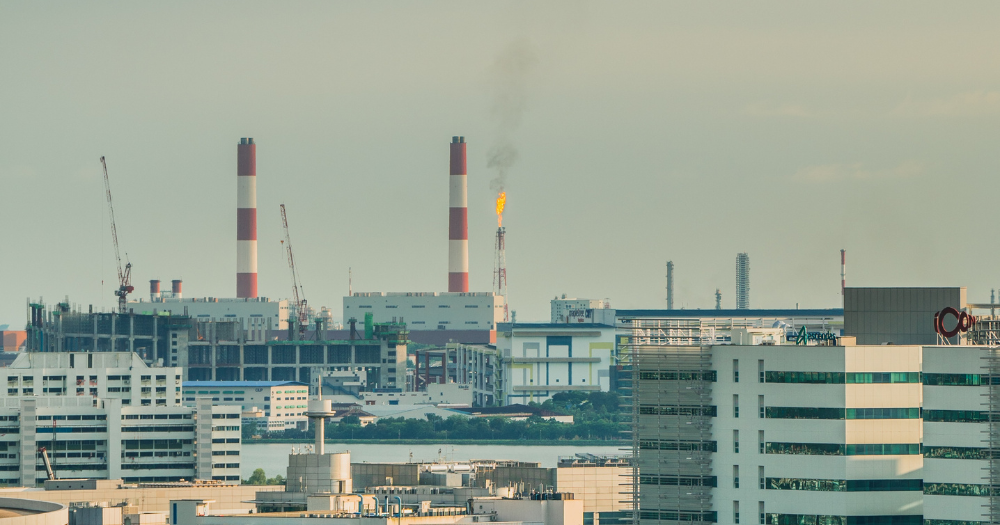Follow us on Telegram for the latest updates: https://t.me/mothershipsg
Singapore has been studying various ways to achieve net zero by 2050.
Hydrogen has emerged as one possibility, and Singapore will be developing it to “support Singapore’s decarbonisation efforts”, Deputy Prime Minister and Minister for Finance Lawrence Wong said at the Singapore Energy Lecture on Oct. 25.
His speech also marked the start of the Singapore International Energy Week, an annual week-long energy event where policy makers and industry players come together to share solutions and best practices in the energy sector.
The energy sector accounting for almost 40 per cent of Singapore’s carbon emissions, decarbonisation efforts in this sector would be significant to the country's effort to reduce its carbon emissions.
How is hydrogen more sustainable?
Hydrogen, including its derivatives such as ammonia, is more environmentally friendly as it does not release any carbon emissions when combusted, unlike fossil fuels and natural gas. Instead, it produces water as a by-product.
According to a press release by the Ministry of Trade and Industry (MTI), the production of hydrogen through low-emission methods, such as through the electrolysis of water using renewable energy, can have close to zero emissions.
It thus has the potential to be adopted in different sectors as low-carbon fuel or feedstock.
Hydrogen can complement and diversify Singapore's power mix, in addition to the current energy sources like solar, imported electricity and possibly, geothermal energy.
"Depending on technological developments and the development of other energy sources, hydrogen could supply up to half of our power needs by 2050. It can also play an important role in decarbonising our industry," MTI wrote in a press release.
Low-carbon hydrogen and hydrogen-derived fuels can also serve as more sustainable alternatives to fossil fuels in Singapore's maritime and aviation industries.
"As the busiest container transshipment port and one of the leading airhubs in the world, Singapore can be a catalyst for the global transition towards greener shipping and aviation," MTI added.
Preparing for hydrogen deployment in Singapore
MTI asserted that the public and private sectors have shown strong interest in speeding up the development of hydrogen across the value chain.
This is despite the fact that many hydrogen technologies are still under development and a global supply chain has yet to be established.
Therefore, Singapore will be taking steps to prepare for hydrogen deployment domestically.
It will also work with partners to build a hydrogen supply chain in Asia.
In his delivery of the Singapore Energy Lecture, Wong outlined Singapore's approach in preparing for hydrogen deployment, and there are five key thrusts to this move.
1. Experimenting with technologies
Singapore will experiment with the use of advanced hydrogen technologies "that are on the cusp of commercial readiness".
An Expression of Interest for a small-scale commercial project to use ammonia for power generation, including developing ammonia supply chains to support marine bunkering needs, will be launched.
The project will allow the government to assess the viability of ammonia as a hydrogen carrier and as a direct fuel.
Authorities can then develop regulations and an ecosystem to support power generation using ammonia through this project.
Further details will be released in the coming months.
2. R&D
Research and development work will be carried out to advance these hydrogen technologies.
Hydrogen will be a key focal area for Phase 2 of the Low Carbon Energy Research (LCER) Programme, which supports research, development and demonstration projects on low-carbon energy technology solutions.
Previously, Phase 1 of the programme saw S$55 million awarded to various projects. Another S$129 million will be set aside for Phase 2.
The government hopes to collaborate with academia and industry in order to be able to import, handle and utilise low-carbon hydrogen and its derivatives safely and at scale.
3. Working closely with stakeholders
The government will work closely with industry and international partners to enable the formation and scaling up of supply chains for low-carbon hydrogen.
This will include ensuring that methodologies are interoperable across jurisdictions, and building a trading and financing ecosystem to facilitate global trade of low-carbon hydrogen.
4. New infrastructure
New infrastructure will be required to support the mass deployment of hydrogen, such as those to import, store and transform hydrogen into power.
MTI stated that the government will develop land and infrastructure plans and pace its implementation accordingly.
5. Workforce training
The adoption of hydrogen will bring about new economic opportunities for Singapore enterprises and its workforce.
The establishment of a hydrogen supply chain will create new job opportunities for its financing, trading, certifying, transporting, storage and deployment.
The government will work with industry and the education sector to support workforce training.
Hydrogen plant in Singapore
Singapore is expected to have its first hydrogen power plant by the first half of 2026.
Keppel Infrastructure revealed in August 2022 that the Keppel Sakra Cogen Plant, which will be built on Jurong Island, is designed to operate on fuels with 30 per cent hydrogen content.
Although it will run initially on natural gas as its primary fuel, it has the capability of shifting to run entirely on hydrogen.
It is slated to produce up to 600MW of electricity, which amounts to around nine per cent of Singapore's peak electricity demand in 2020, and can power around 864,000 four-room HDB flats for a year, reported The Straits Times.
Top photo from Unsplash
If you like what you read, follow us on Facebook, Instagram, Twitter and Telegram to get the latest updates.
